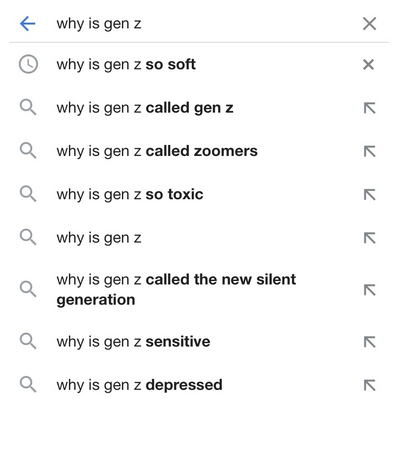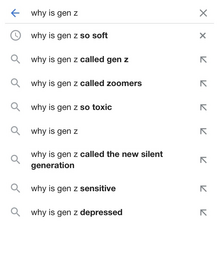Generation Z is the generation of those born between 1997 and 2010. It has been debated as to where the overlap of Gen Z and millennials begins and ends. The Pew Research Center concluded in 2018 that anyone born between 1981 and 1996 is considered a millennial and that the cut-off for Generation Z would be the year 1997. To put that into perspective, anyone who falls in the age range of Generation Z would be around six to 24 years old in 2021.
Being a member of Generation Z is like being a member of a new revolution full of remarkable knowledge, confidence and effort to create real social change. However, amid this knowledge, confidence and social justice come the overwhelming isolation of it all. The isolation of being the only one in a room of past generations who view you as irrational, overly political and sensitive.
Generation Z represents the forefront of leadership in a new generation seeking real improvement for all people. According to Pew Research Center, “Generation Z represents the leading edge of the country’s changing racial and ethnic makeup,” making this generation the most racially diverse generation to date. Likewise, members of Generation Z are more likely than older generations to see the countries growing racial and ethnic diversity as a positive thing.
This is not the only thing that sets Gen Z apart from other generations. Gen Zers are less likely than millennials, Gen X, boomers or the Silent Generation to agree that the United States is better than all other counties in the world. “They see the world so differently than those who came before them,” says Meghan Grace, author of “Generation Z: A Century in the Making.”

I’ve wondered for most of my life why I was angrier by social injustices than that of older generations. More specifically, I’ve wondered why we are a generation insulted for wanting to speak up and defend ourselves and others. In 2018, high school students from all over the country walked out of their school doors in protest of gun violence following the mass shooting at Marjory Stoneman Douglas High School.
This was a national school walkout organized and orchestrated by Gen Z teenagers who were students at the school during the time of the tragedy. I, alongside fellow high schoolers at my school and all over the country, held meetings with the administration insisting that this was something the school needed to allow and not penalize. Following my participation in the walk-out, I was quickly labeled as both a brave activist by some and a sensitive, overly opinionated teen girl by most. Neither seemed to make much sense to me.
I was not a brave activist. I was a pissed-off 17-year-old. I wasn’t overly opinionated or sensitive. I was angry. Angry because 17 innocent lives were lost in a place where they should have been safe. It didn’t seem so political or brave to me. It seemed logical. It was logical. It occurred to me then, as I watched news coverage after news coverage of school after school and teenager after teenager, then that this is a generation of empathy that they are not willing to waste. They want change. We want change.
The generational gap between Gen Z and other generation’s views on race relations has been brewing since the election of Barack Obama, America’s first Black president in 2012. The diversity we saw represented on a larger scale was impactful as it began the first serious political discussions we heard from our parents, peers and teachers. In many ways, the election of Barack Obama set in motion the real change we knew could be done. The real change we believed was coming for our future.

Now, this is not only the first generation to be born seeing a Black president elected, but also the most racially diverse generation in history. To say we were disappointed in the drastic change of the first Black president to an openly racist president would be an understatement. This is why we see mass activism of Gen Z. We were not born thinking it was impossible; we were born seeing that it was. The murder of Trayvon Martin, as well as the murder of George Floyd and Breonna Taylor, would not and will not go unnoticed by this generation.
Young people, Gen Z, and millennials took to their platforms on social media. As of July 7, 2020, “#BlackLivesMatter was used in more than 22 million posts on Instagram, where users share their stories, educational resources, ways to donate and links to petitions. Somewhere around half a million people from nearly 550 places across the U.S showed up to protest in solidarity with the Black Lives Matter movement. So why is this movement so amplified? If the reinforcement of systematic racism in the United States isn’t enough to wake people up, murder should.
Younger generations scroll through timelines on every platform and watch videos of police brutality showing brutal violence and murder of Black men and women. Generation Z wasn’t around 60 years ago, but they are around now, and they refuse to allow injustice to continue as if it is somehow a part of normalcy in America. This is a generation of action.

While researching everything I could on what makes my generation so hungry for change, I stumbled in disbelief at the most popular term used to describe Gen Z. This word was “soft.” This is a word my generation knows all too well. This term is used to describe sensitivity. Not being hard or tough because we complain about the problems amidst our country. Very commonly, you’ll hear older generations rhapsodize about how they had it worse, and they got through it—as if somehow tolerating inequality, inclusivity or financial difficulty is better than wanting it to be better.
To that reasoning, I will just say this, we heard you, and we think you should have had more choices, freedom, respect and opportunity. That is why we demand this for ourselves and generations to come because we heard your complaints for so many years on the news, in the classroom, in the kitchen and, most importantly, online. Generation Z was born into the digital age.
For most of us, as soon as we were old enough to get an iPhone or iPod Touch, we already had access to various social media platforms. Generation Z is the first generation to completely be born in the age of technology. The periods of 1996- 2010 were vast periods of technological development. With the introduction of Facebook in 2004, YouTube in 2005, the iPhone in 2007 and Instagram in 2010, most of us had instantaneous information, praise and criticism right at our fingertips for the majority of our lives.
This fundamentally changed how an entire generation related, communicated and educated themselves. “This new generation is becoming the digital shepherd of a new era in technology adoption and reliance. Their acceptance and usage of technology is likely to be more similar to that of peers in distant countries than grandparents in their own country,” said Jason Dorsey, chief strategy officer of the center, in a study on Gen Z and technology.

It didn’t leave when we turned off the news, stepped out of the classroom or put down a newspaper. It remained in our pocket and on a screen that exposed us to everything. Blissful ignorance is not a simple option for Gen Z and never has been.
We were born right when 9/11 happened. Most of us only children or infants the first time we saw people die on a screen. The Columbine High School shooting happened in 1999. Most of us only children the first time we heard the discussion about school shootings. The Sandy Hook Elementary School shooting happened in 2012—most of us just getting access to an iPhone and barely hitting puberty.
The Marjory Stoneman Douglas High School shooting happened in 2018, while most of us were the age of those who lost their lives. We weren’t slammed into a locker; we were picked apart psychologically by anonymous people on the internet. I have a supercomputer in my pocket that has told me more information than previous generations even knew when they were my age, and I have had this information my entire life. We all have.

This is a generation, the first generation, to experience a global pandemic that stripped some of us of middle school, our senior year of high school, graduation, our college experience and any sense of normalcy for what the future might hold. According to William H. Frey, a senior fellow at the Brookings Institute, “These generations will be the ones to suffer the greatest economic hardship from the COVID-19 pandemic, which will rob them of career-defining education and employment opportunities.”
Not a day goes by where I am not thankful for the generation I was born into. The generation that believes all bodies are beautiful, all people are equal, microaggressions are harmful, women are powerful, intersectional feminism is a priority, the climate needs to be protected, that gender and sexuality are social constructs and that America has a lot more work to do before considering itself a “superpower.”
The isolation I feel stems from this notion that previous generations seem to view this as exclusivity or radical or as if politics are taking over people’s lives and friendships and making us too “soft.” The anxiety I feel to be myself around people older than me is massive; the anxiety I feel knowing all the things that I know. Being so aware of every mistake I’ve made that hurt people due to my ignorance and every child who has grown up afraid of their place because of a land that was never created on liberty and justice for all people.
And if your Gen Z and you’re the sensitive, overly politically opinionated person in your family or in your life, just know that the reason people say that about you is because you are the only one fortunate enough to be born in this incredibly powerful generation. Staying silent is soft. You are as tough as they come. Generation Z is no longer the future, we are the present, and we will get through this.



